Google E-E-A-T is a crucial concept in search engine optimization (SEO) that helps determine the credibility and trustworthiness of web content. Understanding and implementing E-E-A-T principles can significantly impact your website’s rankings and visibility in search results.
In this article, we’ll break down what E-E-A-T stands for, why it matters, and how you can improve your website’s E-E-A-T score.

What Does E-E-A-T Stand For?
E-E-A-T stands for:
- E – Experience
- E – Expertise
- A – Authoritativeness
- T – Trustworthiness
These four factors play a critical role in Google’s Search Quality Rater Guidelines, helping evaluate the quality of web content and determine if it deserves high rankings.
1. Experience
Google introduced the Experience factor in December 2022 to emphasize content created by individuals with firsthand experience. This means Google values content from real users who have actually used a product, visited a place, or performed a task rather than content written purely from research.
Example:
- A travel blog written by someone who has actually visited a destination will have a stronger E-E-A-T score than one written by an AI or someone with no real-world experience.
2. Expertise
Expertise refers to the level of knowledge or skill the content creator has in a particular field. Google prefers content created by professionals or people with proven experience in their niche.
Example:
- A medical article written by a licensed doctor carries more weight than one written by an anonymous blogger with no medical background.
3. Authoritativeness
Authoritativeness is about how respected and recognized a content creator or website is within its industry. It’s influenced by factors like:
- Mentions on reputable websites
- Quality backlinks from high-authority sources
- Social proof (media coverage, industry awards, etc.)
Example:
- A finance blog linked to by reputable financial sites (like Forbes or Investopedia) has higher authority than a random blog with no external recognition.
4. Trustworthiness
Trustworthiness measures how reliable and credible your content is. Google evaluates:
- Accuracy of information
- Transparency (clear author information, privacy policies, contact details, etc.)
- Website security (SSL certificates, HTTPS, no malware)
Example:
- A shopping website with SSL encryption, transparent refund policies, and verified customer reviews will be considered more trustworthy than one with no security measures or hidden policies.
Why is E-E-A-T Important for SEO?
Google’s goal is to provide users with the best, most reliable information. Websites with strong E-E-A-T signals rank higher in search results because they:
✔ Deliver accurate and valuable information
✔ Are seen as credible sources
✔ Help prevent misinformation and scams
E-E-A-T is especially critical for “Your Money or Your Life” (YMYL) topics, which impact users’ finances, health, safety, and well-being.
Examples of YMYL topics:
- Medical advice
- Financial investment tips
- Legal information
- News and politics
If your website covers YMYL topics, Google holds it to higher E-E-A-T standards to ensure users receive safe and factual content.
How to Improve Your Website’s E-E-A-T?
1. Demonstrate Real-World Experience
- Share personal stories, case studies, or real-life examples in your content.
- Include photos, videos, or testimonials to prove firsthand experience.
- If reviewing products, show real usage and results instead of copying generic descriptions.
2. Highlight Your Expertise
- Ensure content is written by knowledgeable individuals.
- Add author bios that showcase credentials, experience, and achievements.
- If possible, have content reviewed or written by industry professionals.
3. Build Authoritativeness
- Get backlinks from reputable websites in your industry.
- Earn mentions in news articles, interviews, or guest posts.
- Create high-quality content that positions you as an industry leader.
4. Boost Trustworthiness
- Use secure HTTPS connections to protect users’ data.
- Display contact information, privacy policies, and clear refund policies.
- Fact-check your content and link to credible sources when making claims.
Does E-E-A-T Directly Affect Google Rankings?
E-E-A-T is not a direct ranking factor (like page speed or keywords), but it strongly influences how Google assesses content quality.
Here’s how:
✔ Websites with high E-E-A-T have a better chance of ranking well in search results.
✔ Websites with low E-E-A-T (such as untrustworthy or inaccurate sites) may struggle to rank.
Example:
- If two health websites publish similar content, the one with experienced doctors, strong references, and high authority links will likely rank higher.
Final Thoughts
Google’s E-E-A-T framework is essential for creating high-quality, trustworthy content. Whether you run a blog, business website, or affiliate site, improving E-E-A-T can help increase your search rankings, credibility, and audience trust.
By focusing on Experience, Expertise, Authoritativeness, and Trustworthiness, you can build a stronger online presence and gain long-term SEO success.
Would you like specific E-E-A-T strategies tailored to your website? Let me know! ?
